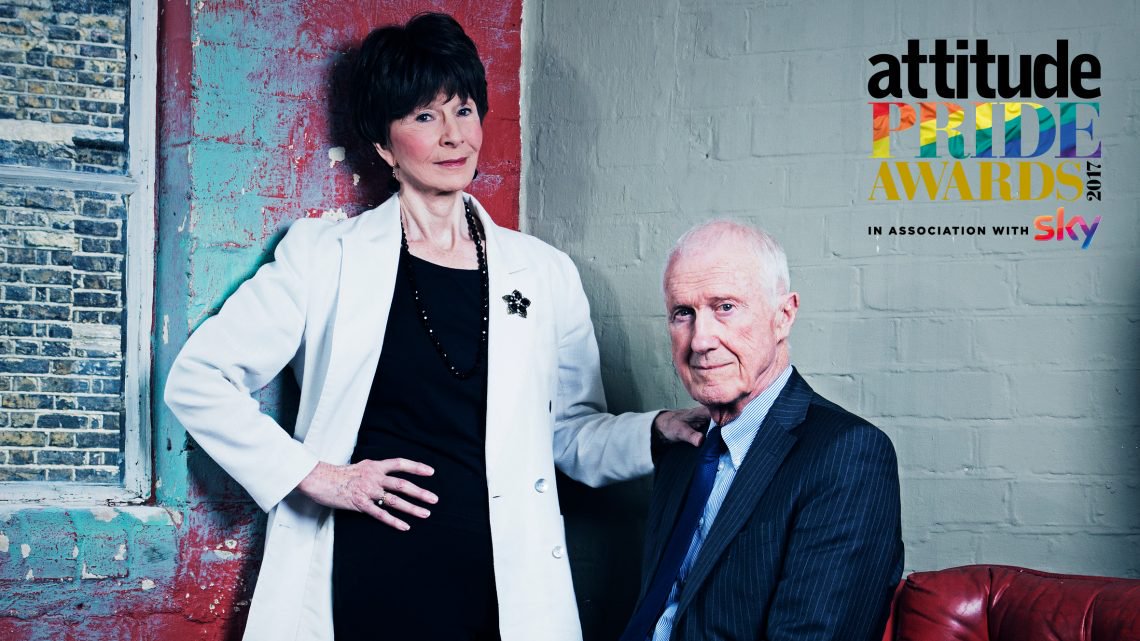Meet the parents who’ve dedicated their lives to fighting for transgender rights
By Will Stroude

When Bernard and Terry Reed’s trans daughter started attending a gender clinic in the late 1980s, the world was a very different place for LGBT+ people. Their daughter had suffered in silence as a teenager, and only finally discussed her gender issues when her mum found out what was happening and raised the subject.
“With the wisdom of hindsight, the signs were there earlier but we didn’t actually read them at the time,” admits Terry. As a Samaritan for 18 years, Terry had often met trans people and immediately understood her child’s need to express her gender identity.
When Terry told her husband of their daughter’s impending transition, he was great. “Not for a moment did he fail to be supportive. He just wanted to help”.
At that time, trans people were obliged to change their gender role and expression in all aspects of their lives, including the workplace, in order to access hormone therapy. Coming out as a woman in an all-male macho environment was bound to be difficult. Their daughter suffered years of torment at the hands of her co-workers, but she feared that if she lost her job, the clinic would withdraw treatment.
“Seeing your own child go through that kind of torture was incredibly painful.” But in the 1990s, society was far from the “trans tipping point” spoken about by Time magazine when they featured Laverne Cox on the cover in 2014. “Society didn’t really understand and the law was very unhelpful,” Terry explains.

It would be 14 more years before the UK’s Gender Recognition Act of 2004 came into force and a further six years until the Equality Act.
“We felt unable to protest about what was happening to her. We shared her fear that losing her job, would put her treatment at risk, so there was little we could do.”
After three years of abuse, their daughter’s resultant physical deterioration made her unable to work and she was fired. Then the Reeds acted. Their daughter’s employers denied all responsibility, accused her of being a fantasist and refused to help her in any way. The arguments went on for a further four years, ending in an Industrial Tribunal in 1996.
“We are persistent people. We were up against a firm with deep pocketsbut we were determined to get justice for our daughter,” Bernard explains.
The tribunal was traumatic for her, but they won, and this galvanised Terry and Bernard into action.
As they worked with others in the field, the Reeds began to see the scale of the problem and realised that if this could happen to their daughter, who was fully supported and loved, other trans people in less supportive environments had to be going through hell. So, they set up a charity: the Gender Identity Research Education Society (GIRES).

“At that time, there was very little information about gender diverse young people as so few were being treated. What we saw then was the suffering in the older people,” explains Terry. “They’d been given the same spiel by doctors as gay men had been: get married, that’ll cure you. All that nonsense.”
The Reeds also met trans people who had been offered, or had undergone, electric shock ‘therapy’, and medical treatment generally fell under psychiatry. Largely, it still does, but there is a growing understanding now that gender incongruence is not a mental illness, any more than being gay, lesbian or bisexual is.
Trans colleagues encouraged Terry to look into the relevant scientific evidence. This was not popular with all trans people, and certainly not with the UK service providers. Nevertheless, many studies have been done which indicate biological factors in the development of gender dysphoria; Terry recently co-authored an article in The Lancet on that topic.
However, as she said in that article, “Whatever our scientific understandings, the needs of transgender people should be met on the basis of universally recognised human rights”.
The couple work with experts worldwide and, in 2016, the World Professional Association for Transgender Health presented them with its education award. Continuous personal contacts by phone and email, with families and individuals grappling with personal loss, public transphobia, health and social inequalities, keep the Reeds grounded in the realities of the lives of trans, non-binary and non-gender people, including those who are young and now seeking good care in rapidly increasing numbers.
These past few years have been busier than ever for the couple, who work for the charity full-time as volunteers.
“We probably feel like everybody working in this field; now is not the time to be backing off and saying, ‘ok we have reached the tipping point, the work’s been done’, because we’ve seen recent political changes that are very unwelcome and things could go backwards [at any time].”
Terry adds: “It doesn’t stop. Whether it’s legal, medical, science, employment, education or whatever, we will keep on pushing.”
Find out more about our Pride Award winners in the August issue of Attitude – out now. Buy in print, subscribe or download.

More stories:
Tom Daley and Dustin Lance Black share adorable never-before-seen wedding photos
Hollyoaks star Andrew Hayden-Smith shares cute snap of himself kissing boyfriend at Brighton Pride
